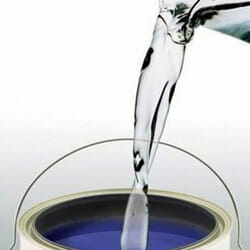
If you’ve ever dabbled in the art of painting, you’ve likely come across paint thinner. But what is it exactly? Simply put, paint thinner is a solvent used to thin thick paint to the desired consistency. It’s a vital component in most painting projects, helping to ensure smooth and even application of paint.
There are different types of paint thinners available, each with unique characteristics suited for specific kinds of paints and painting projects. It’s important to select the right one to achieve optimal results.
One essential thing to keep in mind when using paint thinner is ventilation. The fumes can be potent, making it crucial to work in a well-ventilated area for your health and safety.
While we’re on the subject of thinning agents, let’s shine the spotlight on another unsung hero: mineral spirits. This clear, odorless liquid plays a big role in painting projects, particularly when working with oil-based paints.
When thinking about mineral spirits vs paint thinner, they may seem similar but their interaction with paints is what sets them apart. Mineral spirits are particularly useful for cleaning brushes, as it dissolves the paint residues, making brushes good as new.
Perhaps the most crucial role of mineral spirits lies in cleaning up after oil-based paint projects. It effortlessly cuts through the stubborn layers of dried paint, making clean-up a breeze.
The debate between paint thinner and mineral spirits is as old as the mediums themselves. Both solvents play crucial roles in painting, but their characteristics and functions set them apart.
There are instances where one may be preferred over the other. For instance, mineral spirits are favored when working with oil-based paints because of their effective cleaning properties. On the other hand, paint thinner is generally less expensive and more versatile, making it a go-to for many artists and homeowners.
The impact of each on dry paint also differs. While paint thinner can be harsh on certain surfaces and remove the paint, mineral spirits are generally safer to use on dry paint.
Price-wise, paint thinner usually has the upper hand, being less expensive than mineral spirits. However, the final choice should always be based on the specific requirements of your painting project rather than price alone.
Glycol ethers are a group of solvents that play a critical role in the composition of paint thinners. They improve the performance of paint thinners by enhancing solubility, evaporation rate, and the overall fluidity of the paint.
However, glycol ethers are not without concerns. They’ve been linked to health issues, including skin and eye irritation, and in some cases, more severe complications such as damage to the nervous system when exposed in large amounts. It’s essential to handle paint thinners with care, and always work in well-ventilated areas to minimize exposure to glycol ethers.

Volatile organic compounds, or VOCs, are another key player in the paint thinner vs mineral spirits debate. These compounds, found in both paint thinners and mineral spirits, evaporate at room temperature, contributing to the overall effectiveness of these products.
However, VOCs can pose potential health risks, including eye, nose, and throat irritation, headaches, and in extreme cases, damage to the liver, kidneys, and central nervous system. They also contribute to air pollution and climate change.
Due to these concerns, there’s a growing trend towards low-VOC or VOC-free alternatives in the market. These products aim to maintain the efficacy of traditional thinners and mineral spirits, while minimizing the environmental and health impact.
The relationship between water-based and latex paints and paint thinners is one that requires careful navigation. While you can use water to thin water-based and latex paints, sometimes, a commercial paint thinner is needed for optimal results.
To thin paint effectively, you’ll need to add the thinner gradually, testing the consistency regularly until it reaches the desired thickness. For oil-based paint, mineral spirits are generally the best choice.
Cleaning brushes after using different types of paint requires special consideration. For oil-based paint, use mineral spirits. For water-based or latex paint, warm, soapy water usually does the trick. Always remember to dry your brushes properly after cleaning to ensure they stay in top condition.
Making the most out of a gallon of mineral spirits or paint thinner is an art in itself. One crucial tip to remember is to add these solvents sparingly when thinning oil-based paint; too much can weaken the paint and affect its finish.
Using paint thinner or mineral spirits requires care. Always work in a well-ventilated area, and protect your skin and eyes from direct contact. And while mineral spirits can be more expensive than paint thinner, their effectiveness, especially when working with oil-based paint, can be worth the extra cost.
Achieving a clean painting finish requires precision. When using paint thinner or mineral spirits, apply the thinned paint evenly, ensuring that the surface is clean and primed for the best results. Thinner or mineral spirits can also be used to clean your brushes, contributing to a superior finish.
The consistency of your paint matters. For a smoother application, especially with water-based paint, ensure it’s not too thick or too watery. And of course, make sure you properly store your paint thinner or mineral spirits, keeping them sealed in a cool, dry place to prevent them from evaporating.
Remember, paint thinners include a variety of different chemicals and should always be used in well-ventilated areas. Wear gloves and protective clothing when handling them, as they can cause skin irritation if left on the skin for too long or if you come into contact with your eyes.
Both paint thinner and mineral spirits have their unique characteristics. Your choice between the two should depend on your specific project requirements and the type of paint you’re working with. While paint thinner is generally more versatile and less expensive, mineral spirits can be the better choice for specific jobs, such as thinning oil-based paint or cleaning brushes.
No matter which you choose, safety should always be your top priority. Using these products requires caution, as their fumes can be harmful if inhaled in a poorly ventilated space. If you’re seeking a flawless paint job with no room for error, our team of experts at BCI is at your service, providing professional residential, commercial, and industrial painting services for impeccable results. Whether you’re working with water-based paint, oil-based paint, or anything in between, we’ve got the expertise to bring your vision to life.